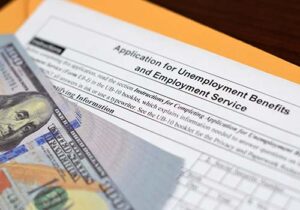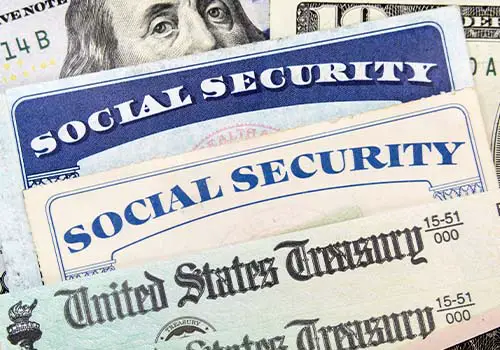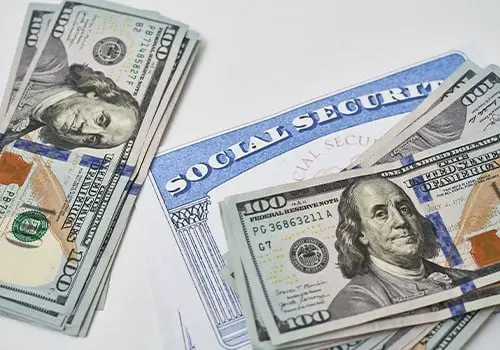If you lose your job through a layoff or some other situation that is not your fault, you might be able to draw unemployment benefits. These benefits often help people bridge the gap between losing their jobs and finding a new one. Unemployment benefits can help people pay their bills and even put food on the table during this transition period.
However, what happens if you already receive Social Security disability benefits? Can you receive both types of benefits at once? Keep reading, and we will tell you everything you need to know about these benefits, as well as whether you can get both payments at one time.
Social Security Disability Benefits Overview
There are two types of Social Security benefits that you might be receiving. Those two types are Supplemental Security Income (SSI) and Social Security Disability Insurance (SSDI). The main difference between the two is the eligibility requirement for work history. You must have a sufficient earnings record to qualify for SSDI benefits. This means you must have paid enough into the Social Security system through Social Security taxes while working to be eligible for benefits. You must have worked full-time for at least ten years to be eligible to receive these benefits.
SSI Benefits
SSI benefits, on the other hand, are only available to those with severe financial need. You must have limited income and resources to qualify for these benefits. Generally, your resources must be less than $2,000. There is no work requirement to qualify for SSI benefits.
For both types of benefits, you must have a disability that prevents you from performing substantial, gainful activity. This means that you are not able to work as a result of your impairment or condition.
The disability must have lasted or been expected to last at least 12 months. Regarding what conditions qualify for disability, the rules are basically the same for SSI and SSDI. The Social Security Blue Book lists impairments that automatically qualify you for benefits. If you do not meet one of these listings, a combination of conditions that ultimately affects your ability to work can still get you qualified.
KEY TAKEAWAYS
- SSI and SSDI are the two Social Security disability benefits. SSDI requires you to meet specific work history requirements; while SSI does not require work history, it does require limited income and resources.
- Most states require you to be actively seeking employment to be eligible for unemployment; however, SSDI & SSI require you to be disabled and unable to work to receive benefits.
- If the administrative law judge (ALJS); who review your disability application, discovers you are receiving unemployment, will probably deny your claim.
Unemployment Benefits Overview
First, the unemployment rules vary from state to state. Since this program is administered jointly by the state and federal governments, each state can set its own rules.
General Qualifications & Limits
At a high level, you can generally receive unemployment compensation when you lose your job through no fault of your own.
- You must have sufficient work and wage history to qualify for unemployment insurance in your state.
- Some states require that you actively look for full-time work while receiving benefits, while others will allow you to receive benefits even if you are only looking for part-time work.
There is a time limit to how long you can receive benefits. If you cannot find a job before your unemployment insurance benefits expire, you might have to look for other financial assistance. The COVID-19 pandemic has caused unemployment rules to change, and people have been able to get extended benefits due to the Coronavirus pandemic.
Application Process
To apply for benefits, your previous employer can often help you start the application process. If they are unwilling to help, you should contact your state’s unemployment insurance office. You should go ahead and apply for benefits as soon as you become unemployed and have all your previous employment details ready as those will need to be included in the application.
Must read articles related to Social Security Award Letters
- What is a Social Security Award Letter…how do you get a copy?
- Learn the steps for setting up or changing your direct deposit.
- Can Social Security benefits be garnished?
- Three easy steps to apply for Social Security benefits.
- How do you manage Social Security benefits online?
SSDI & Unemployment: Can You Get Both?
Many people wonder, “Can you get unemployment and disability?” From a legal perspective, no law prevents you from receiving SSDI and unemployment benefits. Receiving both benefits won’t affect the amount of the other benefits, except in a couple of states like Minnesota and Illinois.
Competing Eligibility Requirements
However, from a practical standpoint, the eligibility for these two programs is fundamentally at odds. To qualify for SSDI benefits, you must certify that you are disabled and unable to work. However, to qualify for unemployment benefits, you must attest that you are willing and ready to work.
Based on your employment status, these two positions directly conflict with each other. The disclaimer here is that there are a few exceptions where you can receive both types of benefits successfully.
Potential Denial of Disability Claim
Regarding the Social Security Administration (SSA) approving your disability claim, most administrative law judges (ALJs) who hear these claims do not like unemployment benefits being paid while you have a pending disability claim.
When you apply for disability benefits, your unemployment benefits record will likely become a part of your file.
- Some judges will not pay your claim if you are receiving unemployment benefits,
- Others might delay your disability onset date until after your unemployment benefits stop.
- In some cases, you might be able to explain to the judge that you were only applying to part-time jobs or light-duty sedentary work.
However, suppose you have been applying for full-time jobs involving manual labor but are telling the judge that you cannot work due to medical conditions. You likely have a problem in that case, and your disability application will probably be denied.
TIP
You’ll unlikely be able to claim disability and still qualify for unemployment. In rare cases, you might be able to convince an ALJS that you were only seeking part-time jobs or light-duty sedentary work.
How SSI Is Impacted By Unemployment Benefits
Can you collect unemployment and disability benefits from SSI? Similar to SSDI benefits, you might have a problem if you claim on your SSI application that you are unable to work yet apply for jobs while receiving unemployment benefits.
SSI Requires Limited Income & Resources
The other consideration here is that SSI payments require you to have limited income and resources. If you receive unemployment benefits, you might also be making too much money to receive SSI benefits. This could present a problem for SSI beneficiaries.
You should know that the Social Security Administration has access to your unemployment records, so they can stop your SSI payments if you start earning too much unemployment income.
The Bottom Line
While receiving both Social Security disability and unemployment benefits simultaneously is feasible, it rarely happens because of the eligibility requirements of each.
Your monthly payment from disability might be affected if you start to receive unemployment. If you have a pending disability application, you should talk to a disability lawyer before filing a claim for unemployment to see how it will affect your pending application.
Unemployment should not affect retirement benefits unless you are below full retirement age and receive more than the earned income limit.
Frequently Asked Questions
By applying for disability, you are stating to Social Security that you are unable to work due to your disability. So, can you work while on disability? Technically, yes, it must be minimal, and there must be little income.
The maximum amount you can earn while receiving SSDI benefits is $1,550 monthly. If you make more than this, your disability will be considered ended, and your benefits will stop.
Typically, your disability benefits are not reduced. You either receive them or you do not. If you are receiving disability benefits and you start to work, then your benefits might be revoked.
You cannot earn more than $1,550 per month working while on SSDI benefits. Remember that SSI benefits require low income and limited resources, so earning money while receiving SSI benefits can also stop those.
In most states, you may receive unemployment for up to 26 weeks. In some situations, the government might decide to extend those benefits.
The COVID pandemic is a great example. With so many people losing their jobs, unemployment rates rose quickly. In that case, the government decided to extend unemployment benefits and add an extra amount to each payment.
But can you draw unemployment if you have filed for disability? Yes, you can, but your application for disability might be denied because you are certifying that you are willing and able to work on your unemployment claim.
You can find a Social Security Administration office near you by using our SSA office locator and searching for your closest location.






